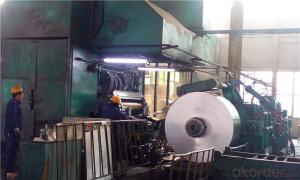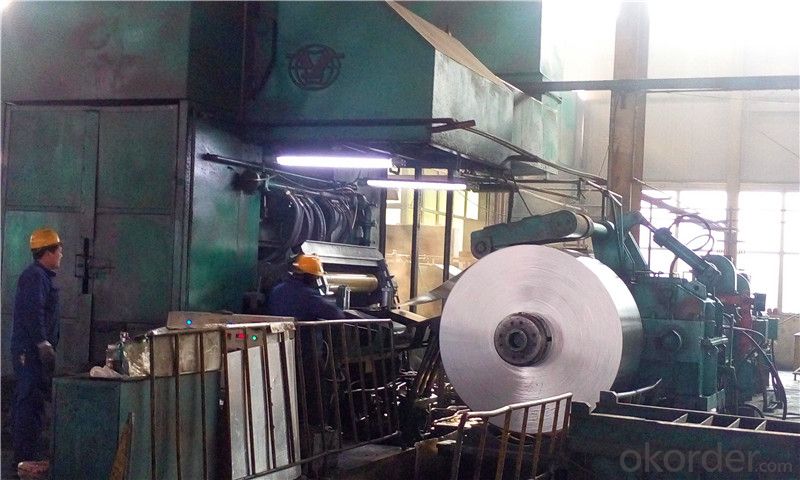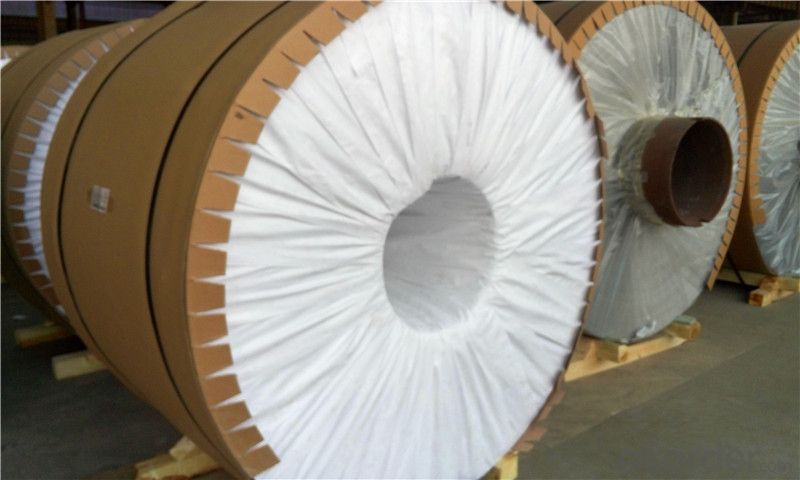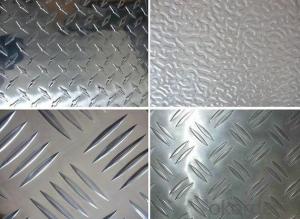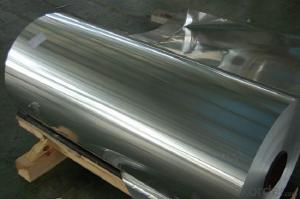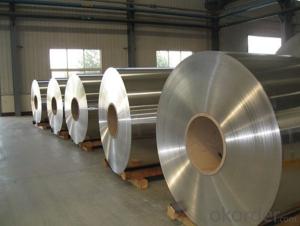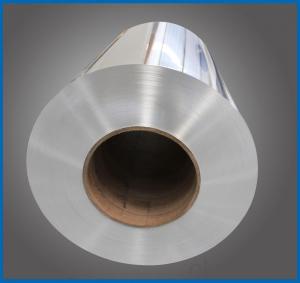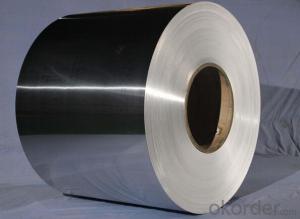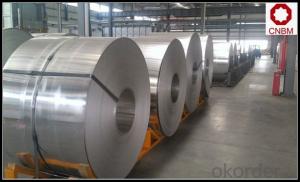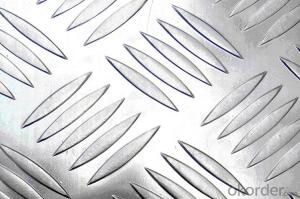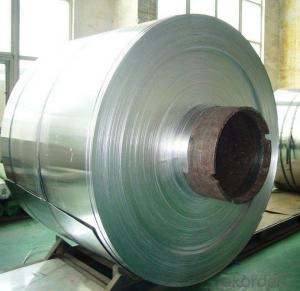Painted Coil Aluminum 3003 H14 H24 - Supplier Factory Price
- Loading Port:
- Shanghai
- Payment Terms:
- TT OR LC
- Min Order Qty:
- 5 m.t.
- Supply Capability:
- 500 m.t./month
OKorder Service Pledge
OKorder Financial Service
You Might Also Like
Specification
Aluminum Coils 3003 H14 H24 From Supplier Factory Price
aluminum coil specifications:
1) Alloy :1050, 1060,1100, 3003 3004 3105 3A21 5005 5052 etc
2) Temper: O/H12/H14/H1/H18/H32/H34/H36/H38//H111/H112/H116/H321/T6/T651/T3/T351 etc
3) Thickness: 0.1mm to 6mm
4) Width:20mm to 3300mm
5)Coil weight: 100kgs to 6 tons depends on actual requirement
6)Core material: Aluminum or paper
7)Coil Inner diameter: 75mm, 150mm, 200mm, 300mm, 405mm, 505mm or as required
8) Protective film can be added
item | 3003 Aluminum coil | |
Standard | GB/T3190-2008,GB/T3880-2006,ASTM B209,JIS H4000-2006,etc | |
Material | 1060,1050,1100 3003,3103,3004,3005,3105 5052, 5454,5754 | |
Size | Thickness | 0.5mm-3.5mm |
Width | 800-1500mm | |
Weight/Roll | About 1.5MT/3MT | |
Quality control | Mill Test Certificate is supplied with shipment, Third Part Inspection is acceptable. | |
Surface | Bright, polished, hair line, brush, checkered, embossed, etc | |
Trade terms | Price term | ,FOB, CNF, CIF, etc |
Payment Term | TT,L/C | |
MOQ | 2MT | |
20 GP Capacity | About 20-25MT | |
Delivery time | 1.The products will delivery immediately after receiving the payment. 2.According to the order quantity, prompt delivery. | |
Export to | Ireland,Singapore,Indonesia,Ukraine,Spain,Canada,USA,Brazil,Thailand,Korea,Iran,India,Egypt,Kuwait, Oman,Viet Nam, South Africa, Dubai, Russia, etc | |
Package | Stick blue film→plastic film→waterproof paper→1~2 tons on a export standard pallet(corner protection) | |
Application | 1)Further making utensil.2)Solar reflective film3)The appearance of the building4)Interior decorating:ceilings,walls,etc.5)Furniture cabinets6)Elevator decoraction7)Signs,nameplate,bags making.8)Decoration inside and outside the car9)Household appliances:refrigerators,microwave ovens,audio equipment,etc.10)The consumer electronics:mobile phones,digital cameras,MP3,etc. | |
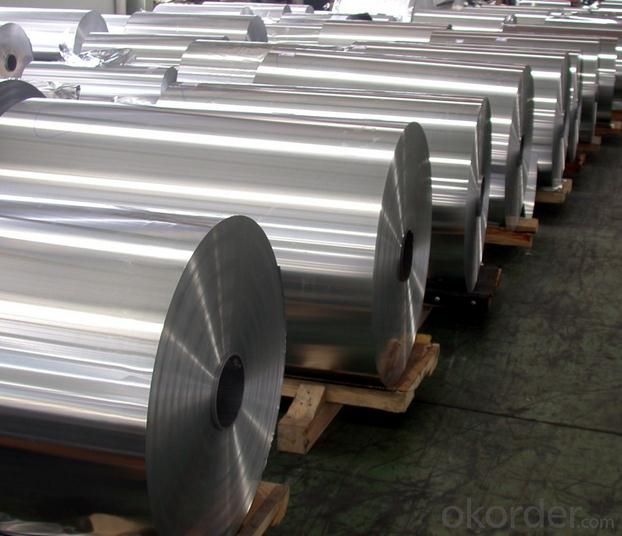
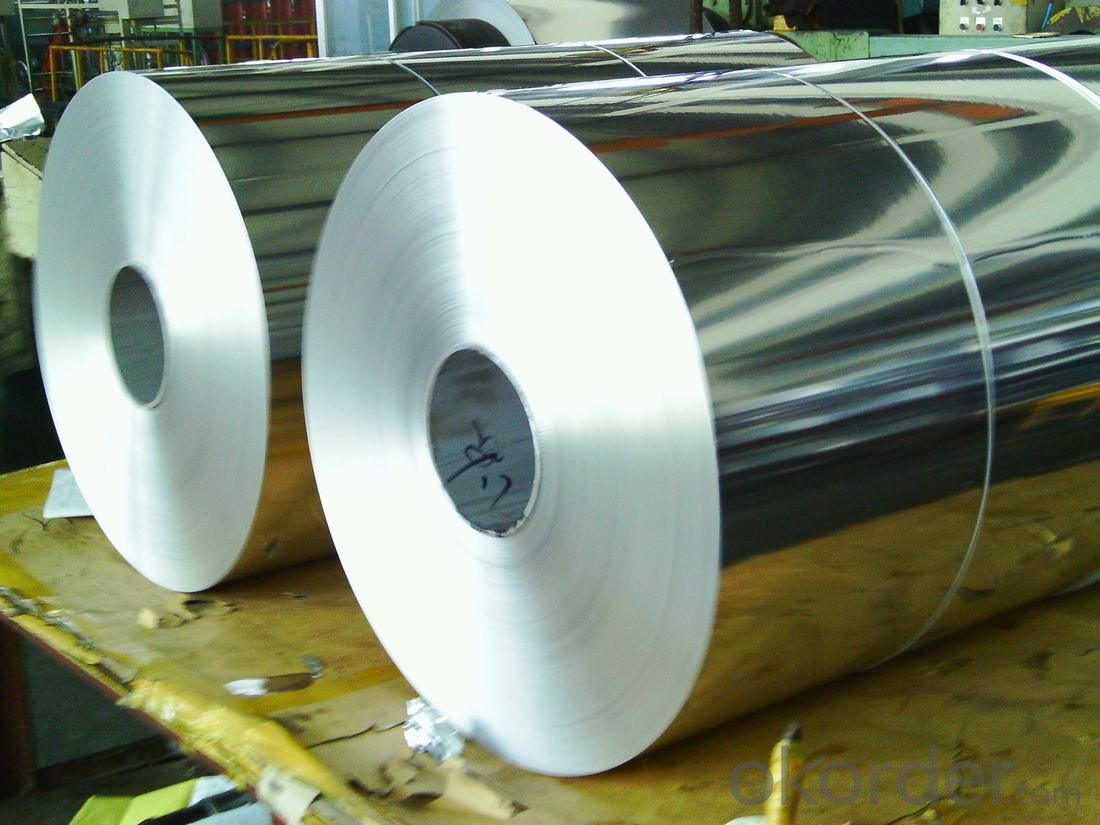
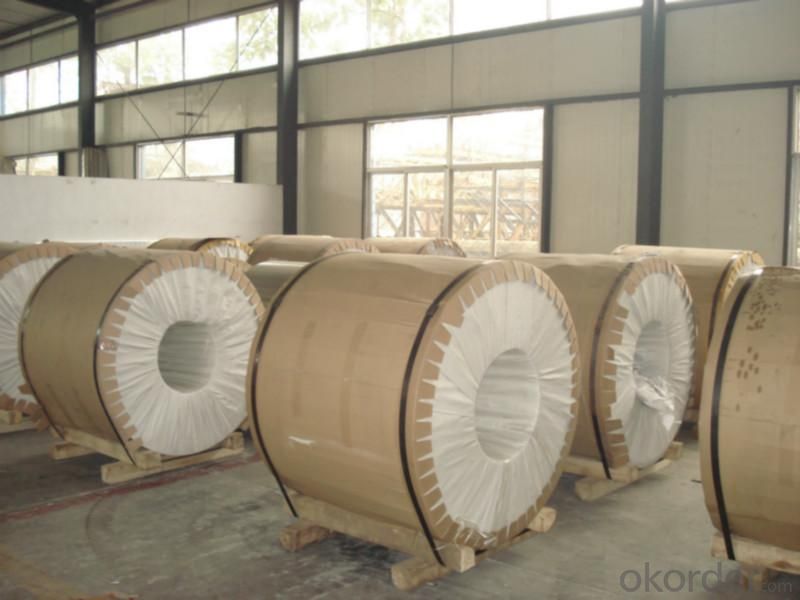
- Q: Can aluminum coils be used for food storage containers?
- Indeed, food storage containers can be made from aluminum coils. Aluminum is widely chosen as a material for such containers because of its numerous advantageous qualities. Notably, it is lightweight, sturdy, and possesses exceptional thermal conductivity, enabling it to distribute heat evenly for effective cooking or cooling purposes. Moreover, aluminum is non-toxic, devoid of odor, and resistant to corrosion, rendering it a secure option for food storage. Additionally, it acts as a proficient shield against light, moisture, and oxygen, thereby assisting in maintaining the freshness and quality of the stored food. All in all, opting for aluminum coils for food storage containers can be a dependable and practical decision.
- Q: What is a better deal?Aluminum Cookware ( Paula Deen)orHard Anodized ( Rachael Ray )
- Neither. For one, stainless steel is the way to go. Secondly, with both of those you're paying more for the celebrity endorsement than you are the quality of the product. Go with All-Clad. If it's too expensive, you're better off deciding on a few pieces that you'll use the most and buying quality rather than an entire set.
- Q: How do aluminum coils contribute to energy savings in buildings?
- Aluminum coils contribute to energy savings in buildings by enhancing the efficiency of heating, ventilation, and air conditioning (HVAC) systems. These coils are commonly used in HVAC units as they have excellent heat transfer properties, allowing for effective heat exchange. As a result, the HVAC system can cool or heat the building more efficiently, reducing the energy consumption required to maintain comfortable indoor temperatures. Additionally, aluminum coils are lightweight and durable, which helps to prolong the lifespan of the HVAC system, reducing the need for frequent replacements and further conserving energy.
- Q: I have found many articles claiming that the aluminum content in soy (baby) formula is very high.What I am wondering is- does regular old soy milk for adult consumption also have very high aluminum content?I am extensively researching all possible ways to relieve my 14 month olds terrible constipation. He is not allergic to milk- he was on a milk-based formula. We VERY slowly switched over to whole cow's milk- which turned out to once again be terribly constipating. It was suggested I give lactose-free milk a try- which has seemed to help a little bit- it was working OK for a few days- but he did have quit the hard (and painful) bowel movement a couple days ago. We are trying other options- juices, he's active, we are trying to get enough fiber into this picky eater's diet. I am just researching the possibility of soy milk if this problem persists.I am not willing to give it to him if the aluminum content is even a small possibility. I am not finding much info about adult soy milk. Anyone??
- I found this on the FAQ for Eden Soy products: Claim 12: Soy foods may contain harmful levels of aluminum. (Fallon, 1996)[21] Answer 12: The author describes aluminum occurring in soy as a result of an industrial processing step. This occurs only when producers use harsh alkaline soaking solutions that leach aluminum from aluminum processing equipment. Not all soy processing uses alkaline soaking solutions and not all soy is produced using aluminum equipment. Harsh alkaline soaking solutions are used mainly in the production of modern soy foods such as soy protein isolates, soy protein concentrates, soy supplements, soy protein shakes, textured soy protein (TSP), etc. Eden does not use alkaline soaking solutions and does not use aluminum equipment. Our test results show no trace of aluminum in Edensoy, testing at a sensitivity of .1ppm. The study it references talks about soy formula, not soy milk. It sounds as if the soy picks up its aluminum content from the manufacturing equipment. Edensoy claims they are aluminum-free (implying that other companies are not)... however, it is of course a biased source! Our oldest has been on soy milk/goat milk combination for a while now (we don't do dairy), however, we are in process of weaning off soy for good as we have other concerns besides aluminum: MEDICAL CONDITIONS POSSIBLY ATTRIBUTABLE TO SOY CONSUMPTION Asthma Chronic Fatigue Depression Diabetes Heart Arrhythmia Heart or Liver Disease Infertility/Reproductive Problems Irritable Bowel Syndrome Learning Disabilities/ADD/ADHD Pancreatic Disorders Premature or Delayed Puberty Rheumatoid Arthritis Thyroid Conditions: Auto-Immune Thyroid Disorders (Graves’ or Hashimoto’s Disease) Goiter Hypothyroidism Hyperthyroidism Thyroid Nodules Thyroid Cancer Other thyroid disorders Uterine Cancer Weight Gain nothing is proven but the possibility is enough for us to give it up).
- Q: How do aluminum coils perform in saltwater environments?
- Aluminum coils perform exceptionally well in saltwater environments due to their natural resistance to corrosion. Unlike other metals, aluminum forms a protective oxide layer when exposed to saltwater, creating a barrier that prevents further corrosion. This oxide layer acts as a durable and long-lasting shield against the harsh effects of saltwater, ensuring the longevity and performance of aluminum coils in marine applications. Additionally, aluminum coils are lightweight and possess high thermal conductivity, making them popular choices for heat exchangers and condensers in saltwater-based cooling systems. Overall, aluminum coils are highly reliable and efficient in saltwater environments, making them a preferred choice for various marine applications.
- Q: I have a diamond back bike with an aluminum frame. will it rust if i ride or put it in the frame? is it bad for the bike?
- No, but take care of it and it will stay looking good too. I keep mine inside. I clean and maintain it all the time! It's almost like a care, the better you take care of it, the better it will run.
- Q: Are there any limitations on the powder coating of aluminum coils?
- Yes, there are limitations on the powder coating of aluminum coils. Firstly, the thickness and quality of the aluminum coil can impact the effectiveness of the powder coating process. If the coil is too thin or of low quality, it may not be able to withstand the heat required for the powder coating process, leading to distortion or damage to the coil. Additionally, the surface preparation of the aluminum coil is crucial for successful powder coating. Any contaminants or impurities on the surface, such as oils, dirt, or oxides, can interfere with the adhesion of the powder coating. Proper cleaning and pre-treatment of the surface is necessary to ensure a smooth and durable coating. Furthermore, the size and shape of the aluminum coil may also pose limitations. Complex shapes or intricate designs may be challenging to coat evenly, resulting in variations in coating thickness or coverage. It may require special techniques or equipment to ensure a uniform and consistent coating. Finally, the choice of powder coating material may impact the limitations. Certain powder coatings may not be suitable for use on aluminum coils due to chemical compatibility issues or inadequate adhesion properties. It is important to select a powder coating material specifically designed for use on aluminum substrates. Overall, while powder coating is a popular and effective method for coating aluminum coils, there are limitations that need to be considered. Proper surface preparation, substrate quality, and coating material selection are crucial factors to ensure a successful and durable powder coating finish.
- Q: What are the common international standards and certifications for aluminum coils?
- There are several common international standards and certifications for aluminum coils that ensure their quality and compliance with industry requirements. These standards and certifications include: 1. International Organization for Standardization (ISO): ISO 9001 is a globally recognized standard for quality management systems. It ensures that the manufacturer has implemented effective quality control processes throughout their production and supply chain, resulting in consistent and reliable aluminum coils. 2. American Society for Testing and Materials (ASTM): ASTM International develops and publishes technical standards for various materials, including aluminum coils. ASTM B209 is a commonly referenced standard for aluminum and aluminum-alloy sheet and plate, which covers the general requirements for flat-rolled aluminum products. 3. European Norms (EN): EN 485 is a European standard that specifies the mechanical properties, dimensions, and tolerances of aluminum and aluminum alloys. It ensures that the aluminum coils manufactured in Europe comply with the specified quality and performance requirements. 4. Japan Industrial Standards (JIS): JIS H 4000 is a set of standards developed by the Japanese Industrial Standards Committee for aluminum and aluminum alloys. It covers the chemical composition, mechanical properties, and dimensions of aluminum coils, ensuring their suitability for various applications. 5. Aluminium Stewardship Initiative (ASI) Certification: ASI is a global, multi-stakeholder initiative that promotes responsible production, sourcing, and stewardship of aluminum. The ASI Certification ensures that aluminum coil manufacturers follow strict environmental, social, and governance standards, including responsible sourcing of raw materials and sustainable production practices. 6. United States Aluminum Association Certification: The Aluminum Association is a trade association in the United States that represents the aluminum industry. Their certification programs, such as the Aluminum Transportation Group (ATG) Certification, ensure that aluminum coils meet the industry's specific requirements for automotive, aerospace, and other transportation applications. These standards and certifications provide assurance to customers that the aluminum coils they are purchasing meet the necessary quality, performance, and sustainability standards. It is important for manufacturers and suppliers to adhere to these international standards to gain credibility and maintain the trust of their customers in the global market.
- Q: What are the fire-resistant properties of aluminum coils?
- Due to its inherent characteristics as a metal, aluminum exhibits excellent fire-resistant qualities when formed into coils. With a melting point of 660 degrees Celsius (1220 degrees Fahrenheit), aluminum can endure high temperatures without melting, thereby making aluminum coils resistant to fire hazards. Furthermore, unlike certain other metals, aluminum does not produce flammable gases when exposed to fire. This non-combustible attribute prevents the fire from spreading and minimizes the potential for fire-related damages. Additionally, due to its low thermal conductivity, aluminum does not efficiently conduct heat. Consequently, aluminum coils do not facilitate the transfer of heat from one area to another, which aids in containing and controlling the fire's spread. Moreover, aluminum coils frequently undergo a protective coating process to enhance their fire resistance. These coatings, composed of materials like polyvinylidene fluoride (PVDF) or polyester, create an additional barrier against fire and heat. Engineered to withstand extreme temperatures while maintaining their integrity, these coatings further bolster the fire-resistant qualities of aluminum coils. In summary, aluminum coils possess exceptional fire-resistant characteristics owing to their high melting point, non-combustible nature, low thermal conductivity, and protective coatings. These attributes make aluminum coils a dependable choice for applications where fire safety is paramount, such as in building construction, electrical wiring, and transportation industries.
- Q: hey, my dad and i are working on painting our front door and the current piece of aluminum in front of it wont go with the new color. it doesnt look like it can be changed out so we are wondering, other than spray paint, what can you put on aluminum to make it turn permanently black. my dad mentioned gun blue, but that only works on steel. thanks
- Dad is on the right track....maybe. There are blackeners for aluminum you can get from gunshops. Used to touch up scratched or worn black anodized finish on aluminum gun parts. Never used it in large areas. Best regards
Send your message to us
Painted Coil Aluminum 3003 H14 H24 - Supplier Factory Price
- Loading Port:
- Shanghai
- Payment Terms:
- TT OR LC
- Min Order Qty:
- 5 m.t.
- Supply Capability:
- 500 m.t./month
OKorder Service Pledge
OKorder Financial Service
Similar products
Hot products
Hot Searches
Related keywords
